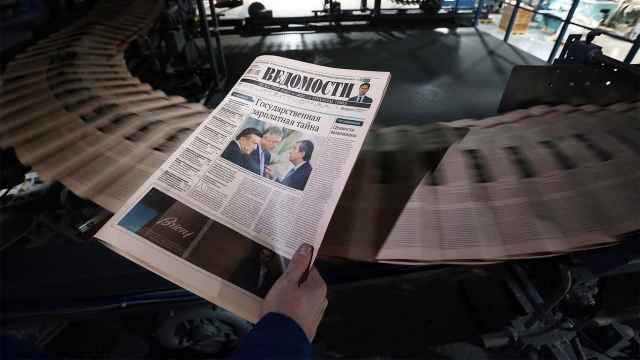Russia is losing one of its last independent publications — the Russian edition of Forbes magazine.
The story sounds more comic than tragic: After receiving the newest issue of the magazine, the editorial team discovered that a key article — about billionaire Ziyavudin Magomedov — had been mysteriously removed from the print issue.
Forbes longtime editor Nikolai Mazurin then posted the article on the web and filed a complaint with the district prosecutor. After the move, the publisher and license holder of the magazine, ACMG, which belongs to businessman Alexander Fedotov, blocked the editorial team from the website, cut off their office's electricity and hired a successor from Playboy magazine.
For Western audiences, this may sound like a run-of-the-mill story from an authoritarian country. Many know Russia as the headquarters of troll factories, fake news and kleptocracy, so the vast majority of readers will be more surprised by the fact that any independent publications existed in the first place.
But let me explain. The Russian edition of Forbes was not just “another business magazine” on the shelf. Rather, it was an incredibly important institution that played a key role in the uneasy relationship between the United States and Russia.
Established in 2003, Forbes Russia became the fifth, but by far the best, magazine in the international Forbes family. Bursting with ads, it was a true diamond in the Forbes crown. (Disclaimer: I was Forbes' chief editor for almost three years, from 2011 to 2013.)
The first license belonged to Axel Springer, and the founding team of journalists was truly brilliant. It included figures like Paul Khlebnikov, an American-born journalist and writer who was assassinated less than three months after the magazine was launched, Leonid Bershidsky, currently one of the most popular columnists at Bloomberg and Maxim Kashulinsky, an experienced business editor who led the magazine for seven years after Khlebnikov’s tragic death.
Forbes’ commercial and editorial success was a reflection and result of the enormous success of the Russian economy — fuelled by galloping oil prices — during Putin’s first two presidential terms. The Forbes team witnessed and bore testimony to the magazine’s phenomenal growth.
Following the best practices of American investigative journalism, the magazine was the first outlet to report on the Rotenberg brothers and the first to publish a Russian interview with Gennady Timchenko (both are some of Putin’s closest allies). Forbes also broke the story about Yevgeny Prigozhin (“Putin’s cook,” who was indicted on criminal charges in the U.S. earlier this year) and had many other scoops of equal impact.
Most importantly, the team meticulously calculated the wealth of the first 100, and then 200, richest people in the country. The names of the Russian business people that frequently appear in the U.S. press now — be they connected to power or independent, under sanction or living in exile — were mostly discovered by the Russian Forbes team.
Ironically, when the U.S. Treasury Department published its list of Russians who could face further sanctions, including 96 billionaires, some people joked that the officials had simply copy-pasted the Russian part of the Forbes list.
Since 2003, when the magazine was established, Russia has experienced tremendous change. Its romance with the West has turned into a deep disappointment and a new Cold War.
Foreign media companies, restricted from owning assets in the country, left; Forbes transferred its license to Russian publisher Fedotov in 2015. Since then, the magazine has lived through one editor’s resignation after another, fended off scandals with employees and had its accounts blocked by tax authorities.
But the few journalists who have exposed Russian wealth to the global public for the past 15 years have continued their work. In a burst of dark humor, someone on Facebook joked that three of them — Nikolai Mazurin, Yelena Berezanskaya and Igor Popov — altogether spent 40 years on calculating the Russian Forbes list.
They might be people of different political views and some of them may be criticized for supporting Crimea's annexation and “collaboration with [Putin’s] regime” by their former colleagues. But none of that matters as long as they keep doing their job: non-partisan, fair and investigative journalism. And that is what they do.
Here I could type up an easy conclusion: Russian media owners are under tremendous pressure and don't dare to raise their voice in protest against the Kremlin. But is this story really about the Kremlin? Are we talking about political pressure, or just a faltering license holder who fails to follow international editorial standards? Shouldn’t Forbes headquarters raise their voice? And shouldn’t they, perhaps, stop turning a blind eye to what’s going on in so-called “tough” countries?
For me, the answer is obvious.
Elizaveta Osetinskaya is the founder of The Bell news start-up. The views and opinions expressed in opinion pieces do not necessarily reflect the position of The Moscow Times.
A Message from The Moscow Times:
Dear readers,
We are facing unprecedented challenges. Russia's Prosecutor General's Office has designated The Moscow Times as an "undesirable" organization, criminalizing our work and putting our staff at risk of prosecution. This follows our earlier unjust labeling as a "foreign agent."
These actions are direct attempts to silence independent journalism in Russia. The authorities claim our work "discredits the decisions of the Russian leadership." We see things differently: we strive to provide accurate, unbiased reporting on Russia.
We, the journalists of The Moscow Times, refuse to be silenced. But to continue our work, we need your help.
Your support, no matter how small, makes a world of difference. If you can, please support us monthly starting from just $2. It's quick to set up, and every contribution makes a significant impact.
By supporting The Moscow Times, you're defending open, independent journalism in the face of repression. Thank you for standing with us.
Remind me later.








